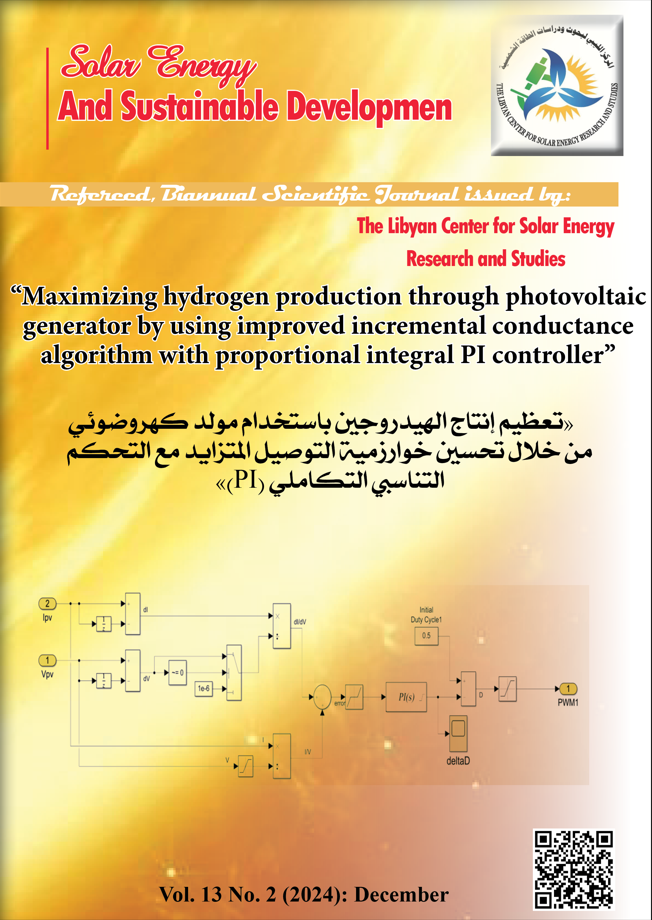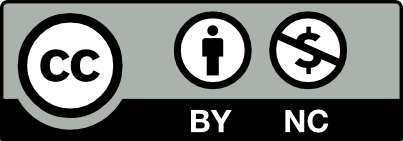Maximizing hydrogen production through photovoltaic generator by using improved incremental conductance algorithm with proportional integral PI controller
DOI:
https://doi.org/10.51646/jsesd.v13i2.229الكلمات المفتاحية:
Hydrogen production، DC-DC step-down converter، photovoltaic generator، PEM electrolyzer، Incremental conductance، PI controller، MATLAB/Simulink.الملخص
Effectively storing energy for prolonged periods poses a primary challenge for renewable and innovative energy sources. This research focuses on two key objectives: first, converting photovoltaic (PV) voltage to the necessary level for electrolysis through a buck converter, and second, utilizing a maximum power point tracking (MPPT) method to optimize the solar generator's efficiency. The simulation of the solar-driven buck converter for the electrolysis load was carried out using MATLAB/Simulink, integrating an Incremental Conductance (INC) MPPT algorithm with a PI controller for system optimization. The simulation results reveal the stabilization of both the generated power from the PV system and the load voltage. Significantly, the proposed system achieves an efficiency surpassing 90% under high irradiance levels.
التنزيلات
المقاييس
المراجع
C. Yu, M. Moslehpour, T. K. Tran, L. M. Trung, J. P. Ou, and N. H. Tien, ‘Impact of non-renewable energy and natural resources on economic recovery: Empirical evidence from selected developing economies’, Resources Policy, vol. 80, p. 103221, Jan. 2023, doi: 10.1016/j.resourpol.2022.103221. DOI: https://doi.org/10.1016/j.resourpol.2022.103221
International Energy Agency, Global EV Outlook 2019: Scaling-up the transition to electric mobility. in Global EV Outlook. OECD, 2019. doi: 10.1787/35fb60bd-en. DOI: https://doi.org/10.1787/35fb60bd-en
K. Alanne and S. Cao, ‘An overview of the concept and technology of ubiquitous energy’, Applied Energy, vol. 238, pp. 284–302, Mar. 2019, doi: 10.1016/j.apenergy.2019.01.100. DOI: https://doi.org/10.1016/j.apenergy.2019.01.100
Mahjabeen, S. Z. A. Shah, S. Chughtai, and B. Simonetti, ‘Renewable energy, institutional stability, environment and economic growth nexus of D-8 countries’, Energy Strategy Reviews, vol. 29, p. 100484, May 2020, doi: 10.1016/j.esr.2020.100484. DOI: https://doi.org/10.1016/j.esr.2020.100484
M. A. Abdelkareem et al., ‘Optimized solar photovoltaic-powered green hydrogen: Current status, recent advancements, and barriers’, Solar Energy, vol. 265, p. 112072, Nov. 2023, doi: 10.1016/j.solener.2023.112072. DOI: https://doi.org/10.1016/j.solener.2023.112072
C. Tarhan and M. A. Çil, ‘A study on hydrogen, the clean energy of the future: Hydrogen storage methods’, Journal of Energy Storage, vol. 40, p. 102676, Aug. 2021, doi: 10.1016/j.est.2021.102676. DOI: https://doi.org/10.1016/j.est.2021.102676
T. Ikuerowo, S. O. Bade, A. Akinmoladun, and B. A. Oni, ‘The integration of wind and solar power to water electrolyzer for green hydrogen production’, International Journal of Hydrogen Energy, p. S0360319924005548, Feb. 2024, doi: 10.1016/j.ijhydene.2024.02.139. DOI: https://doi.org/10.1016/j.ijhydene.2024.02.139
S. Shiva Kumar and H. Lim, ‘An overview of water electrolysis technologies for green hydrogen production’, Energy Reports, vol. 8, pp. 13793–13813, Nov. 2022, doi: 10.1016/j.egyr.2022.10.127. DOI: https://doi.org/10.1016/j.egyr.2022.10.127
M. E. Şahin, H. İ. Okumuş, and M. T. Aydemir, ‘Implementation of an electrolysis system with DC/DC synchronous buck converter’, International Journal of Hydrogen Energy, vol. 39, no. 13, pp. 6802–6812, Apr. 2014, doi: 10.1016/j.ijhydene.2014.02.084. DOI: https://doi.org/10.1016/j.ijhydene.2014.02.084
A. H. A. Rahim, A. S. Tijani, M. Fadhlullah, S. Hanapi, and K. I. Sainan, ‘Optimization of Direct Coupling Solar PV Panel and Advanced Alkaline Electrolyzer System’, Energy Procedia, vol. 79, pp. 204–211, Nov. 2015, doi: 10.1016/j.egypro.2015.11.464. DOI: https://doi.org/10.1016/j.egypro.2015.11.464
A. Garrigós, ‘Combined maximum power point tracking and output current control for a photovoltaic-electrolyser DC/DC converter’, i n t e r n a t i o n a l j o u r n a l o f h y d r o g e n e n e r g y.
P. K. Pathak and A. K. Yadav, ‘Design of battery charging circuit through intelligent MPPT using SPV system’, Solar Energy, vol. 178, pp. 79–89, Jan. 2019, doi: 10.1016/j.solener.2018.12.018. DOI: https://doi.org/10.1016/j.solener.2018.12.018
P. K. Pathak, A. K. Yadav, and P. A. Alvi, ‘Reduced oscillations based perturb and observe solar maximum power point tracking scheme to enhance efficacy and speed of a photovoltaic system’.
F. Saadaoui, K. Mammar, and A. Hazzab, ‘Modeling of photovoltaic system with maximum power point tracking control by neural networks’, IJPEDS, vol. 10, no. 3, p. 1575, Sep. 2019, doi: 10.11591/ijpeds.v10.i3.pp1575-1591. DOI: https://doi.org/10.11591/ijpeds.v10.i3.pp1575-1591
K. K. Rout, D. P. Mishra, S. Mishra, and S. R. Salkuti, ‘A painstaking analysis of various conventional and AI based MPPT approaches to the PV framework’, IJPEDS, vol. 14, no. 4, p. 2338, Dec. 2023, doi: 10.11591/ijpeds.v14.i4.pp2338-2346. DOI: https://doi.org/10.11591/ijpeds.v14.i4.pp2338-2346
V. Guida, D. Guilbert, and B. Douine, ‘Literature Survey of Interleaved DC-DC Step-Down Converters for Proton Exchange Membrane Electrolyzer Applications’, TEEE, vol. 3, no. 1, p. 33, Mar. 2019, doi: 10.22149/teee.v3i1.129. DOI: https://doi.org/10.22149/teee.v3i1.129
D. Taufik, ‘Practical Design of Buck Converter’.
M. Anam, H. I. Gomes, G. Rivers, R. L. Gomes, and R. Wildman, ‘Evaluation of photoanode materials used in biophotovoltaic systems for renewable energy generation’, Sustainable Energy Fuels, vol. 5, no. 17, pp. 4209–4232, 2021, doi: 10.1039/D1SE00396H. DOI: https://doi.org/10.1039/D1SE00396H
F. Gambou, D. Guilbert, M. Zasadzinski, and H. Rafaralahy, ‘A Comprehensive Survey of Alkaline Electrolyzer Modeling: Electrical Domain and Specific Electrolyte Conductivity’, Energies, vol. 15, no. 9, p. 3452, May 2022, doi: 10.3390/en15093452. DOI: https://doi.org/10.3390/en15093452
M. C. Möller and S. Krauter, ‘Hybrid Energy System Model in Matlab/Simulink Based on Solar Energy, Lithium-Ion Battery and Hydrogen’, Energies, vol. 15, no. 6, p. 2201, Mar. 2022, doi: 10.3390/en15062201. DOI: https://doi.org/10.3390/en15062201
M. Rizwan, V. Alstad, and J. Jäschke, ‘Design considerations for industrial water electrolyzer plants’, International Journal of Hydrogen Energy, vol. 46, no. 75, pp. 37120–37136, Oct. 2021, doi: 10.1016/j.ijhydene.2021.09.018. DOI: https://doi.org/10.1016/j.ijhydene.2021.09.018
D. Martinez and R. Zamora, ‘MATLAB Simscape Model of An Alkaline Electrolyser and Its Simulation with A Directly Coupled PV Module’, vol. 8, no. 1, 2018.
J. Wei, Y. Gu, and X. Wu, ‘A desulfurization fuel cell with alkali and sulfuric acid byproducts: a prototype and a model’, Sustainable Energy Fuels, vol. 5, no. 14, pp. 3666–3675, 2021, doi: 10.1039/D1SE00659B. DOI: https://doi.org/10.1039/D1SE00659B
J. Zou et al., ‘Electrochemical Compression Technologies for High-Pressure Hydrogen: Current Status, Challenges and Perspective’, Electrochem. Energ. Rev., vol. 3, no. 4, pp. 690–729, Dec. 2020, doi: 10.1007/s41918-020-00077-0. DOI: https://doi.org/10.1007/s41918-020-00077-0
M.-R. Tahan, ‘Recent advances in hydrogen compressors for use in large-scale renewable energy integration’, International Journal of Hydrogen Energy, vol. 47, no. 83, pp. 35275–35292, Oct. 2022, doi: 10.1016/j.ijhydene.2022.08.128. DOI: https://doi.org/10.1016/j.ijhydene.2022.08.128

التنزيلات
منشور
كيفية الاقتباس
إصدار
القسم
الرخصة
الحقوق الفكرية (c) 2024 Solar Energy and Sustainable Development Journal

هذا العمل مرخص بموجب Creative Commons Attribution-NonCommercial 4.0 International License.













